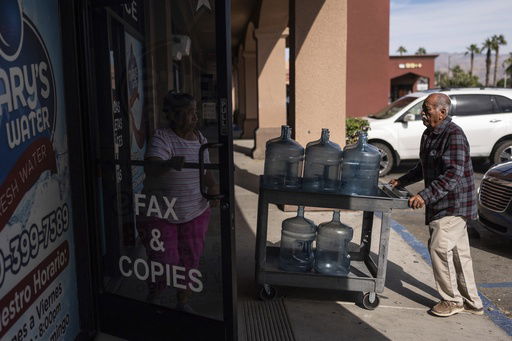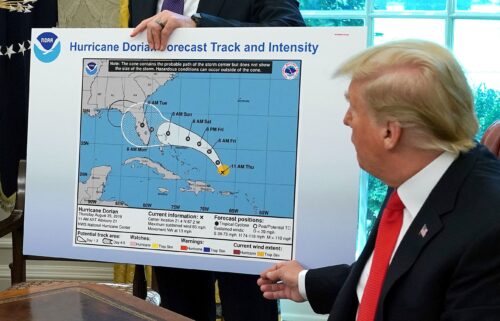LOCALIZE IT: See whether mobile home parks top the list for drinking water violations in your state

M.K. WILDEMAN and MICHAEL PHILLIS
EDITORS/NEWS DIRECTORS:
Millions of mobile home park residents across the United States can’t count on clean and safe drinking water — or even basic oversight to ensure it.
A review by The Associated Press found nearly 70% of mobile home parks that run their own water systems violated safe drinking water rules over in the last five years, a higher rate than utilities that supply water for cities and towns, according to Environmental Protection Agency data. And the problems are likely to be even bigger since the EPA database doesn’t catch all parks.
The AP also found that mobile home parks violate federal drinking water rules more often than other small systems, especially when it comes to submitting required tests and reports on time. More than half broke such rules in the last five years, and 41% did so repeatedly. And in some states, parks also had unsafe contaminants in their water more often.
The U.S. has some 50,000 water utilities, most serving small towns and rural areas. Many struggle to find expert staff and funding, and they violate clean water rules more often than the handful of large utilities that serve cities. But even among the hard-pressed small utilities, mobile home parks stand out.
Other parks aren’t fully protected by the Safe Drinking Water Act, which ensures that utilities provide clean, safe drinking water to people. Even where parks get water from an outside source — such as a city — the clean water coming into the park can become contaminated if it passes through problematic infrastructure before reaching resident’s taps. Since the EPA doesn’t generally require this water to be tested and regulated, the problems may go unseen.
Below, we explain how to use AP’s data analysis, which focuses on eight states where mobile home parks violate federal drinking water laws far more frequently. It also includes tips on writing from the data, accessing federal records for other states, and investigating the issue in your own community.
___
READ AP’S COVERAGE
For millions in US mobile home parks, clean and safe tap water isn’t a given
Takeaways from AP’s report on water quality and safety at US mobile home parks
___
MOBILE HOME PARKS IN THESE STATES HAVE GREATER RATES OF DRINKING WATER VIOLATIONS
AP’s review of EPA data found that in some states, mobile home parks violate rules much more often:
— Arizona
— Delaware
— Illinois
— Indiana
— Iowa
— North Carolina
— South Carolina
— Texas
Explore data for this group of states here.
The first tab includes summarized data for these eight states, followed by tabs listing mobile home systems in each of these states.
All of the data here reflects active systems as of the latest EPA update, which was the first quarter of 2025.
___
USING THE DATA: GENERAL DEFINITIONS
All water utilities here are “community water systems,” meaning they supply water to at least 25 people (or have at least 15 service connections), and do so year-round.
We define “small water systems” as any serving 500 people or fewer. We are only comparing mobile home parks with small water systems, which are likelier than large systems to have the same issues as mobile home parks.
Only violations that occurred in the last five years are counted.
Below is a description of each field and how you can interpret the statistic for your state:
— — —
USING THE DATA: OVERALL VIOLATIONS (COLUMNS B, C and D)
— “Pct. of water systems that primarily serve mobile home parks” AND “Count of water systems that primarily serve mobile home parks”: These water systems’ key population is a mobile home or trailer park.
— “Pct. of all violations by mobile home parks”: The numerator is the sum of all violations that those mobile home park water systems made. The denominator is the sum of all violations.
Together, these fields would allow you to write: “In Delaware, mobile home parks make up 43% of water systems, but committed 65% of all drinking water violations in the last five years.”
— — —
USING THE DATA: HEALTH-BASED VIOLATIONS (COLUMN E, F and G)
These are considered the most serious violations because they pose immediate risks to human health. Typically, this flag is triggered in the data when a water system reports levels of a contaminant that exceed the allowable limit. Most often, these are biological contaminants found in groundwater or the byproducts of disinfectants.
— “Pct. of small mobile home park water systems with a health-based violation”: This shows the share of active, small water systems that primarily serve mobile home parks AND had at least one health-based violation in the last five years.
— “Pct. of other small water systems with a health-based violation”: This shows the same measure as above, but for all small water systems, which are known to commit health-based violations more often than larger systems. Note this EXCLUDES mobile home parks.
These fields would allow you to write: “In Arizona, 61% of mobile home park water systems had a health violation in the last five years — compared to 42% of all other small water systems.” OR using Column G you could write: “In North Carolina, mobile home park water systems made health violations at about twice the rate of other systems of a similar size in the last five years.”
— — —
USING THE DATA: REPORTING + MONITORING VIOLATIONS (COLUMNS H, I and J)
These are the most frequent kind of violations — they involve cases where water systems failed to adhere to federal reporting rules, like submission of regular tests.
— “Pct of small mobile home parks with reporting/monitoring violations”: The share of active, small water systems that primarily service mobile home parks AND had at least one reporting and monitoring violation in the last five years. This is filtered to small water systems so you can directly compare it to …
— “Pct. of other small water systems with reporting/monitoring violations”: This figure EXCLUDES mobile home parks.
These fields would allow you to write: “In South Carolina, 41% of mobile home park water systems failed to adhere to routine monitoring rules at least once in the last five years — compared to 26% of all other small water systems.” OR using column J you could write: “In North Carolina, mobile home park water systems failed to adhere to routine monitoring rules at about two times the rate of other systems of a similar size in the last five years.”
___
REPORTING THREADS FOR PARKS WITH LOTS OF VIOLATIONS
See a park in your community in the data? You can get a rundown of its problems through the EPA’s website. We’ve done a lot of that work for you. For each state tab in the spreadsheet, look for the column labeled “System Envirofacts link.”
Here’s an example of what you might see following those links. In the Arizona tab, let’s look at the utility with the most violations, “CS EL PRADO WATER COMPANY.”
This utility has had a lot of problems in recent years, according to the results. Scroll down to “Three-Year Compliance History by Quarter” and you’ll see a sampling of the rules that have been broken in recent years. Read down further to the section “SDWA Violations and Enforcement Actions (5 Years)” and you’ll see that arsenic testing violated federal standards. That’s a problem because arsenic has been linked to various cancers and other health problems like stomach pain and skin discoloration. The utility has missed lead and copper testing requirements among others violations in recent years. Some of these are resolved, but there’s a clear history here of problems.
___
IF YOU NEED TO LOOK UP A SYSTEM THAT WE DON’T LIST
If you need to look up a system that we don’t list, you can check the agency’s database called ECHO, or Enforcement and Compliance History Online. In the facility search function, there’s a red box called “Search Media Program” up high. Select “Drinking Water (SDWA)” in the pull down menu.
Then in the third section titled “System Characteristics” there’s an entry box titled, “PWSID (Separate multiple IDs with a semicolon, comma, space, or new line).” You want to enter the PWSID there — examples are in Column A in the spreadsheet for each state tab — then hit search. If you don’t know the PWSID, you can also search by city and state (remember to select the right media program, Drinking Water (SDWA), first).
Even one health violation can be a major issue and the state is responsible for enforcing clean drinking water rules. You can give state regulators a call to ask for more information about what they are doing to ensure the utility complies with the law and if they have had to take any enforcement action against the owner.
If there are even a fraction of the amount of problems as are seen in this example, residents are likely to be concerned, refuse to drink the water or complain about how it tastes or smells. What is the state or park owner doing about it?
___
DOES MY STATE EVEN REGULATE PARKS NEAR ME?
Some mobile home parks don’t supply their own water, but get it from a local town or city. These mobile home parks are typically private property, and that can mean that drinking water rules don’t cover problems with private infrastructure and water in the park — that’s the responsibility of the park owner.
It’s rare for a state to regulate water in private parks — Utah, for example, is one of the very few states that does. This can leave residents frustrated and vulnerable. They don’t know who to turn to for help when they encounter a whole host of problems: discolored water, low water pressure, smelly water or fears of contamination.
Ask state regulators what they do if the water that enters a park is clean, but gets contaminated within the park’s private property by bad infrastructure? A lot of times, there may not be any rules. We can see how significant this is, however, by what’s happened in Michigan where this has repeatedly caught the attention of activists and the legislature. If state officials say the local health department can step in when there are safety concerns, ask the last time that happened. It probably rarely, if ever, does.
You know your community. Are there mobile home parks that have a reputation for having issues? If so, some mobile home parks have Facebook groups or homeowners associations that are good starting points for finding residents and figuring out if there are issues. MHAction is the national activist group for mobile home park residents and they may have ideas about how to find people near you, too. You can also try to knock on residents’ doors — a great way to quickly hear from people in a setting where they are most likely to speak freely — although you may need to be careful about trespassing rules in private parks.
In problematic mobile home parks, you may find that people have had to deal with horrible water problems for years even when the water is fine in the neighborhoods nearby. Some may need to buy bottled water and filters — a possible strain for fixed-income residents — or they’ll worry about the impacts of letting their families drink water they don’t trust. Those can be compelling stories.
___
EMBED THIS GRAPHIC
The graphic shows a general, simplified overview of water distribution and where the safe drinking water act standards apply. This graphic is current as of July 24, 2025 and will not update. Source: AP
To embed, insert this code into your CMS:
!– start AP embed —
iframe src=“https://interactives.ap.org/graphics-2025/safe-drinking-water-act/” class=“ap-embed” width=“100%” frameborder=“0″ scrolling=“no” marginheight=“0″
/iframe
script defer src=“https://interactives.ap.org/graphics-2025/resize-client.js” type=“text/javascript”/script
!– end AP embed —
___
Localize It is a resource produced regularly by The Associated Press for its customers’ use. Questions can be directed to the Local News Success team at localizeit@ap.org.




